Michaela School made being Muslim seem toxic, former pupil says
- Published
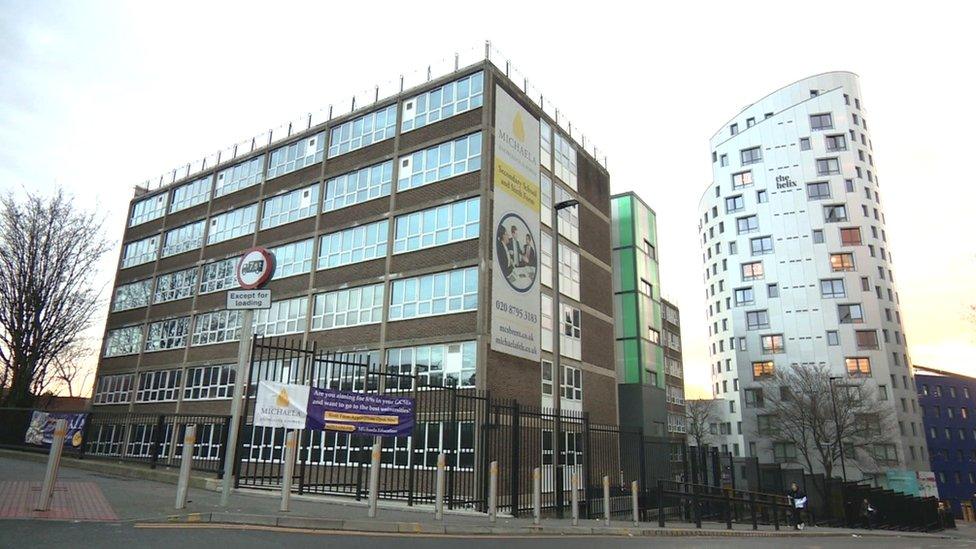
Michaela School is being challenged in the High Court over rules stopping "prayer rituals"
The "prayer ban" by a school facing a court challenge made being Muslim "seem toxic" and "evil", former pupils claim.
Michaela School in Brent, north London, introduced a policy in March 2023 stopping "prayer rituals".
The school, led by former government social mobility tsar Katharine Birbalsingh, is being challenged in the High Court over the policy.
It did not respond for comment but Ms Birbalsingh previously said the school was a "happy and respectful" place.
She added that Muslim students have had "positive experiences" at the school.
The 11-18 mixed secondary school and sixth form is known for its "tiger teaching" approach, where pupils are expected to adhere to strict rules including focusing on teachers extensively during lessons and remaining silent in corridors, as well as restrictions on uniform and slouching.
It has received praise for producing excellent results and has an outstanding Ofsted rating.
The High Court previously heard about half the school's roughly 700 pupils are Muslim, and that its stance on prayer was first introduced in March last year by founder and headteacher Ms Birbalsingh - later being "remade" by its governing body in May.
The court hearing has now concluded and Mr Justice Linden is due to make his ruling at a later date.
Two former pupils at the school, Selena and Sarah (not their real names), have spoken exclusively to BBC London anonymously, claiming the rules at the school disproportionately affected Muslim students.
Sarah said day-to-day life at the school was stressful and detentions for "silly mistakes" were common, adding any obedience from pupils came "from fear rather than the children actually wanting to learn".
'Stripped of my identity'
Both Selena and Sarah joined the school before the rules prohibiting prayer rituals were implemented, but were still pupils when it came into force.
"Once I did find out about the prayer ban, I felt like the school had stripped me and other students of my Islamic identity," Selena said.
"I felt belittled and that I had to somewhat change who I was in order to fit in because it's like they made it seem that being overtly Muslim was non-British or toxic. So I could never really be true to myself."
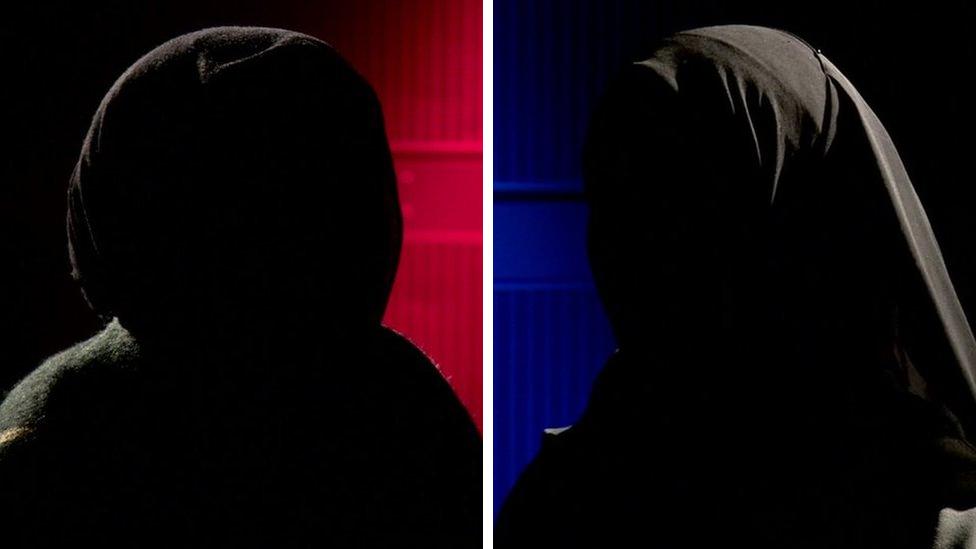
Selena and Sarah allege prayer rules have disproportionately affected Michaela School's Muslim pupils
She added: "I talked to my mum about it; she didn't know she was sending me off to a school where I wasn't allowed to pray.
"School is stressful and prayer was the only time I got to just connect to God and just find peace and connect to myself again, and it helped me with my learning - the fact that I couldn't pray any more, it honestly did more bad than good," Sarah said.
"That absolutely just made me just dread going to school."
Selena recalled how at one point before the current rules came into place some pupils learnt they were allowed to pray outside, but when they did so "they were tapped by another teacher" in the yard who told them to stop.
"One of them in particular got very argumentative, telling her, 'Why you stopping me from praying?'
"And the teacher responded saying, 'Well, you're in a school.' She said that she's not allowed to bring her prayer mat and that if she was to bring her prayer mat again, that it would be confiscated," she said.
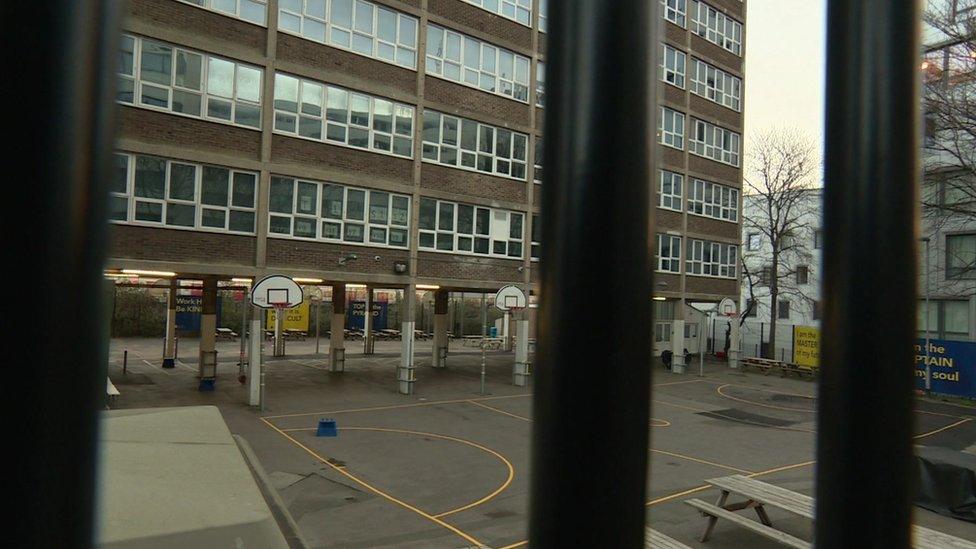
Sarah said she disliked having to pray outside "on the hard concrete" as pupils could "get hit by a basketball, and the noise is just so loud"
Selena believes the restrictions on prayer are a sign of a wider issue at the school - that of "a culture amongst all the teachers to not respect our hijab and respect our religion".
The two girls said they were also expected to tuck their hijab into the collar of their school shirt.
"I remember my teacher telling me twice to fix the way my hijab looked, because they didn't like the fact that it was like hanging out, but that's how hijab looks," Selena explained.
"Once I was walking in the corridor and a teacher said to this other Muslim student that her hijab looked like a cape."
Sarah said she too received insensitive comments from staff when she chose to start wearing a hijab during her time at the school.
"I do remember a teacher asking me if I was forced to wear it and it just shocked me so much," she said.
She explained it made her feel staff believe that "Muslim kids wearing a hijab or practising their faith cannot come out of pure will; they're doing it because they're oppressed or pressured".
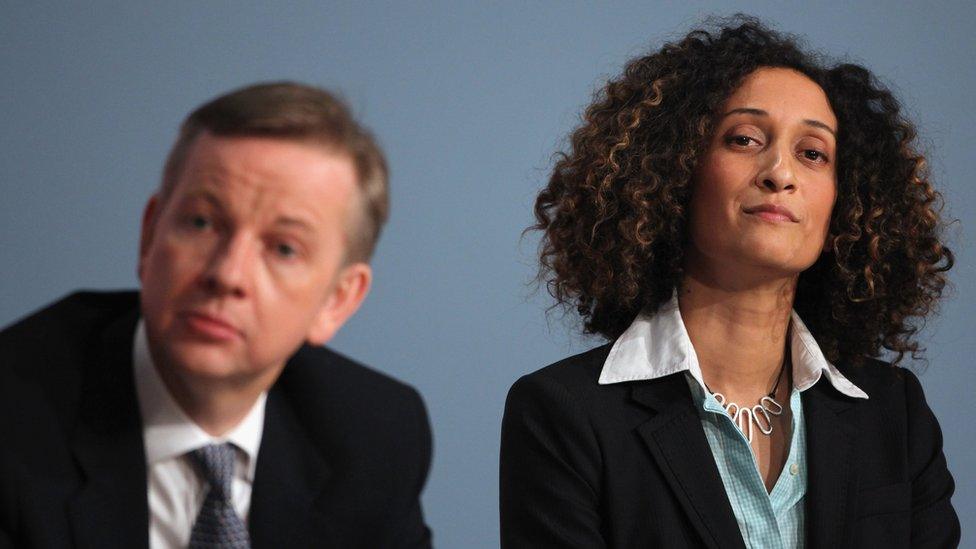
Katharine Birbalsingh set up Michaela School with the help of then-education secretary Michael Gove
One relative of a current pupil showed BBC London their complaints to authorities about the school previously, but said nothing was done.
The relative, who wished to remain anonymous, said they emailed Brent Council but were told "because Michaela is a [free school] they can't enforce anything".
The individual then complained to the Department for Education (DfE), which told them "I have to go through the complaints procedure at the school".
When they then complained to the schools inspectorate Ofsted it told them "the resolution of individual issues falls to the school's senior leadership team and/or the local authority or multi-academy trust", suggesting they raise concerns formally "through the school's own complaint process".
The relative said they did not go through the internal complaints process as they felt it wouldn't be dealt with.
Sarah said her family also complained to Ofsted, but were told "there's nothing they can do about it".
'Toxic narrative'
Michaela School did not respond when asked about the pupils' comments.
However, in a post on X, formerly Twitter, after the court hearings began, Ms Birbalsingh said the governing body stopped what she called "prayer rituals" - including Muslim prayers which are spoken out loud - and "we are in court to defend the culture and ethos of Michaela".
"Ours is a happy and respectful secular school where every race, faith and group understands self-sacrifice for the betterment of the whole," she said.
She said existing Muslim students have had "positive experiences" and these "have helped grow the number of Muslim pupils at the school by 50%".
"Multiculturalism can only succeed when we understand that every group must make sacrifices for the sake of the whole. We allow our children freedoms of all sorts, as long as those freedoms do not threaten the happiness and success of the whole school community," she added.
Court reporting restrictions currently prevent the identification of any current Michaela School pupil or staff except the headteacher.
BBC London approached the school asking to speak to any Muslim pupils or parents who were happy with the school's policy on prayer under anonymity, but did not receive a response.
Selena said she feels Ms Birbalsingh is making excuses for the prayer rules.
"It seemed like she was trying to insinuate that once you take religion out of the picture, that's when you can be successful - that's when, you know, good things can happen to you. I feel like that's a very toxic narrative to try and spread," she said.
Sarah told the BBC she felt that Ms Birbalsingh was "trying to villainise us, she's trying to make us seem evil for wanting to have our own rights [to pray at school]".
Ofsted said it did not comment on "individual complaints".
The DfE responded to the BBC's request for comment with guidance stating: "It is for academies to handle complaints made against them and they are responsible for resolving them.
"Before complaining to the DfE, complainants need to complete the school's complaints procedure unless a child is not getting an education, a child has been exposed to harm or the school is stopping the complainant from following its complaints procedure."
A Brent Council spokesperson said: "The claim relates to Michaela Community School, which is an academy free school and, therefore, not within the control of the local authority.
"Any complaints relating to schools should be directed at that school's complaints process."

Listen to the best of BBC Radio London on Sounds and follow BBC London on Facebook, external, X, external and Instagram, external. Send your story ideas to hello.bbclondon@bbc.co.uk, external
Related topics
- Published17 January 2024
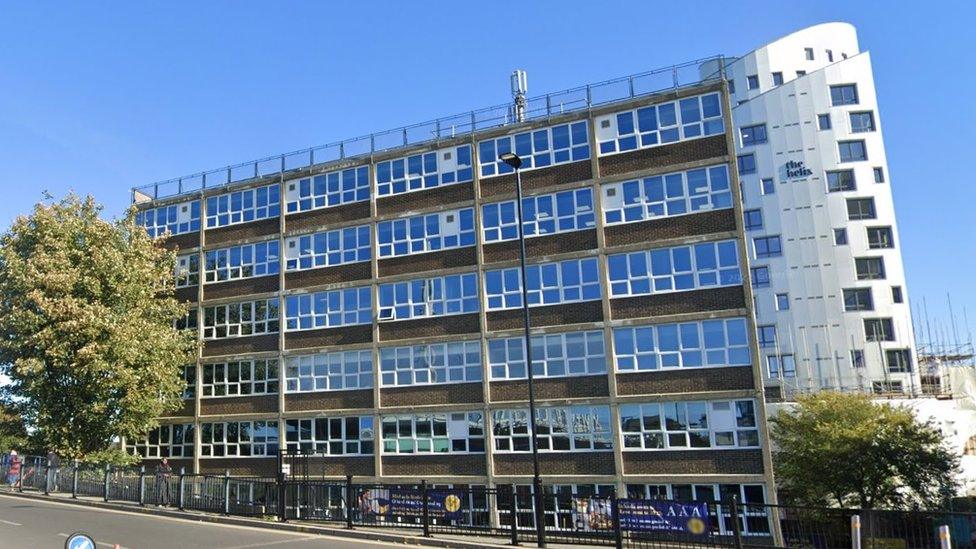
- Published16 January 2024
